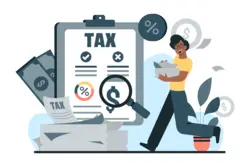So you want to start a business. If you’ve been looking into the process of starting a business in the United States, you may have come across the acronym, EIN in your research. If you’re like most new entrepreneurs you may be wondering, what an EIN number is, and why and how to get an EIN number. An EIN is essentially like a Social Security number for your business. It’s a nine-digit identification code that allows the US government, state governments, other businesses, banks, and the IRS to identify your business for reporting and tax purposes. Read on to find out what an EIN number is, why you need it, and how to apply for an EIN.
What Does EIN Stand For?
As we touched on, EIN is an acronym. But what does EIN stand for? It stands for “Employer Identification Number.”
An EIN is also sometimes called a federal tax ID number, federal identification number, federal employer identification number, or federal EIN.
What Is an EIN Number Used For?
What is EIN’s purpose? An EIN is a type of tax identification number (TIN). Much like a social security number, your EIN is primarily used to identify your business for tax purposes. You will need it to apply for business licenses, open a business bank account, create official financial reports, hire employees, establish vendor accounts, file taxes, and sign tax-related documents. If you’re a tax preparer or someone who files tax returns electronically, you will also need an EFIN.

What Does an EIN Number Look Like?
An EIN is a nine-digit identification number. When you see it in writing, an EIN number looks much like a Social Security number. However, it is split only once after the first two numbers (XX-XXXXXXX). A social security number, on the other hand, is usually split after digits three and five (XXX-XX-XXXX).
Who Needs an EIN?
Not every business needs an EIN. As we touched on, an EIN is a type of TIN number, but there are other types of TIN numbers. There are 5 types of TIN numbers:
- SSN: Social Security Number
- FEIN/EIN: Employer Identification Number
- ITIN: Individual Taxpayer Identification Number. This is for individual taxpayers who are ineligible for an SSN, such as some residents or undocumented immigrants.
- ATIN: Taxpayer Identification Number. This number is for Pending U.S. Adoptions
- PTIN: Preparer Taxpayer Identification Number. This is for accountants who file taxes on behalf of others.
As you may have noticed, not all of these EIN numbers are relevant to businesses. The major thing US-based businesses with US-citizen owners need to understand is the difference between an EIN & an SSN and who needs which number.
So who needs an EIN? In general, an EIN is necessary for businesses that either employ other people, have a multi-ownership structure (such as is the case with a partnership, corporation, or LLC), or those that are making a major change to their structure.
For sole proprietorships, for example, a Social Security number (SSN) is the most common type of tax identification number because it is the individual, not the business, that is paying taxes on earned income. The same is the case with a single-member LLC. However, some sole proprietors choose to get an EIN number anyway to protect their identity.
But if there are two individuals tied to a single business entity, then the business is considered to have its own tax burdens. In this case, an EIN is required.
How many EIN numbers can you have?
For sole proprietorships, you can only be issued one EIN number. In the event the owner or legal information needs to change, you will have to file the correct paperwork to update/change your EIN. However, if you’re working to build business credit or need to differentiate between federal and business credit reporting, you might also need a DUNS number in addition to an EIN.
For multi-member businesses such as a corporation or LLC, there is no limit to the number of EINs you can have. Whether or not you need more than one EIN will depend on how your business operates.
For example, a large corporation only needs one EIN for the entire business entity. But if you choose to silo off divisions into their own business entities for tax purposes, you can file for a new EIN number for each of those divisions (as they are now separate tax entities). You may also choose to take this route for multiple locations.
Where can I find my EIN?
If you are unsure of whether or not you already have an EIN number or how to find it, there are many different ways to look up your EIN to find your employer identification number or confirm whether or not you have one.
How to Get an EIN Number

Getting an EIN should happen after you’ve formed your business as a legal entity and gotten a designated business legal name. You will need both of these pieces of information when you apply for an EIN number.
To get an EIN number, You will need to apply for it on the IRS website. The application is free and you can receive your EIN immediately.
How much does it cost to get an EIN?
The application, processing, and distribution of EIN numbers are completely free.
How long does it take to get an EIN number?
So, how long does it take to get an EIN? In most cases, an EIN can be issued immediately. Though if you are filing for more complicated situations such as an update to an EIN number or requesting tax-exempt status, the process may take a bit longer.
How to Apply for an EIN
Next, let’s talk about how to apply for an EIN.
A TIN is issued either by the IRS, (Internal Revenue Service), or the SSA, (Social Security administration). (Source) EIN numbers specifically are issued by the IRS.
As a quick recap: you will need to formally form your business structure before you can apply for an EIN number. So if for example, you are looking to form an LLC, you will need to take that step first. Once your business is formed, you may apply for an EIN number. The IRS will ask for your business structure and formation date on the application.
You can apply for an EIN number online through the IRS website. If you’re applying by mail or fax, you’ll need to complete IRS Form SS-4. Please note that there are some exceptions to who is eligible for processing an online application that the IRS website linked above will clarify.
What type of EIN should you apply for?
When registering as a business entity for tax purposes, several different TIN options are available. As we mentioned above, not all TIN options apply to businesses, and not all businesses need an EIN.
If you are a sole proprietor or single-member LLC, you are eligible to use your social security number as your TIN. If you have a multi-member business structure or wish to protect your identity and avoid the use of your Social Security number, you are eligible for an EIN.
What is a responsible party on your application?
The IRS defines a responsible party as “the person who ultimately owns or controls the entity or who exercises ultimate effective control over the entity. Unless the applicant is a government entity, the responsible party must be an individual.”
Note: there can only be one responsible party per EIN.
So You’ve Obtained Your EIN, What’s Next?
Now you know what an EIN number is, what EIN stands for, and how long it takes to get an EIN. You also know why and how to get an EIN number for your business and how to apply for an EIN.
If you’ve taken the necessary steps to obtain your EIN, you may be thinking, now what?
After you have received your EIN number it’s time to start gathering the necessary pieces to form an official business.
Now, it may be time to:
- Open a business bank account
- Start to build business credit for loan purposes
- Apply for business licenses
- Establish vendor relations and agreements
- Register for state registries
- Apply for state employer identification information if applicable
- Review other small business legal requirements
- Apply for merchant services
Starting a new business is an exciting venture, and these details make up the less glamorous side of entrepreneurship. But taking the necessary steps to properly and legally form your business will save you a lot of time, confusion, and headaches down the line.






